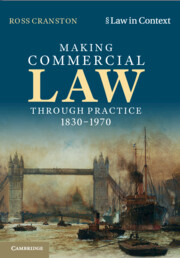Book contents
- Making Commercial Law Through Practice, 1830–1970
- The Law in Context Series
- Making Commercial Law Through Practice, 1830–1970
- Copyright page
- Dedication
- Contents
- Figures
- Preface
- Note on Terms and Archives
- Table of Cases
- Table of Legislation
- 1 Commercial and Legal Contexts
- 2 The Commodity Markets of London and Liverpool
- 3 Agents, ‘Agents’ and Agency
- 4 Sale, Hire and the Distribution of Manufactured Goods
- 5 International Commodity Sales
- 6 Bank Finance for Trade and Industry
- Index
5 - International Commodity Sales
Published online by Cambridge University Press: 14 May 2021
- Making Commercial Law Through Practice, 1830–1970
- The Law in Context Series
- Making Commercial Law Through Practice, 1830–1970
- Copyright page
- Dedication
- Contents
- Figures
- Preface
- Note on Terms and Archives
- Table of Cases
- Table of Legislation
- 1 Commercial and Legal Contexts
- 2 The Commodity Markets of London and Liverpool
- 3 Agents, ‘Agents’ and Agency
- 4 Sale, Hire and the Distribution of Manufactured Goods
- 5 International Commodity Sales
- 6 Bank Finance for Trade and Industry
- Index
Summary
To satisfy an industrialising and industrialised Britain, huge quantities of ‘soft’ commodities - grain, cotton, coffee, cocoa, sugar and palm oil – were grown, harvested and transported from North America, the steppes of Russia, Asia, Africa and the southern hemisphere for sale on the commodity markets of London and Liverpool. Sales of commodities in the first part of the nineteenth century were by dealings on physical markets and by auction. Trade associations like the London Corn Trade Association formed from the mid-nineteenth century had as a major aim the formulation of standard form contracts to govern the international sale of these commodities. Sale in this way need not be on physical markets or by auction, but could be at a distance. These standard form contracts modified the default rules of sales law. They are the precursors of contracts used world-wide today. Although governed by English law, they were adopted internationally. Traders in other countries had an input into their formulation. In drawing them up trade association members took the lead, with lawyers ‘on tap, not on top’. Disputes were settled by arbitration provided in the contract, and relatively few reached the courts. Untoward court decisions were remedied by redrafting the contracts.
Keywords
- Type
- Chapter
- Information
- Making Commercial Law Through Practice 1830–1970Law as Backcloth, pp. 294 - 375Publisher: Cambridge University PressPrint publication year: 2021

